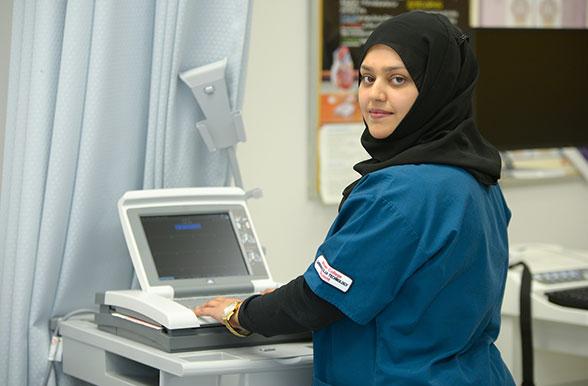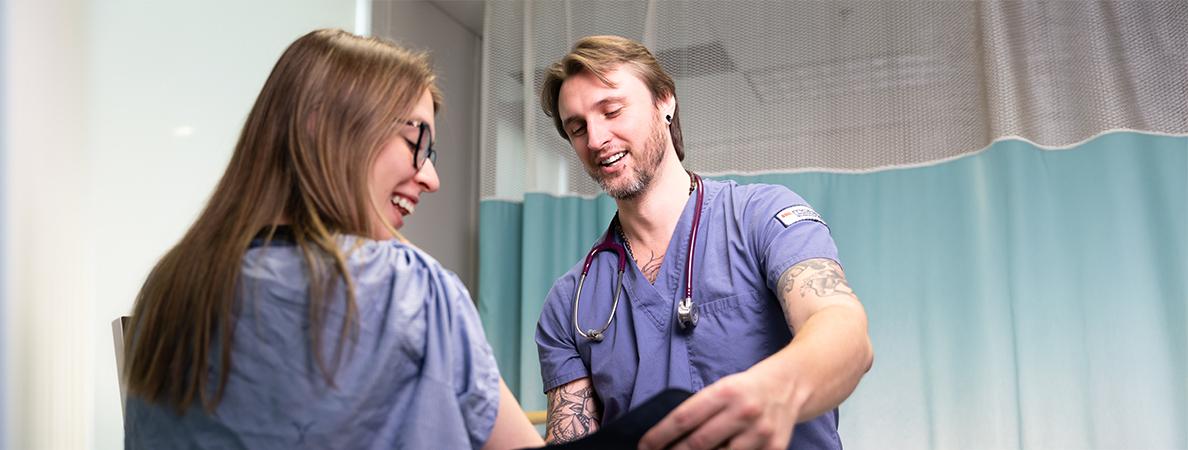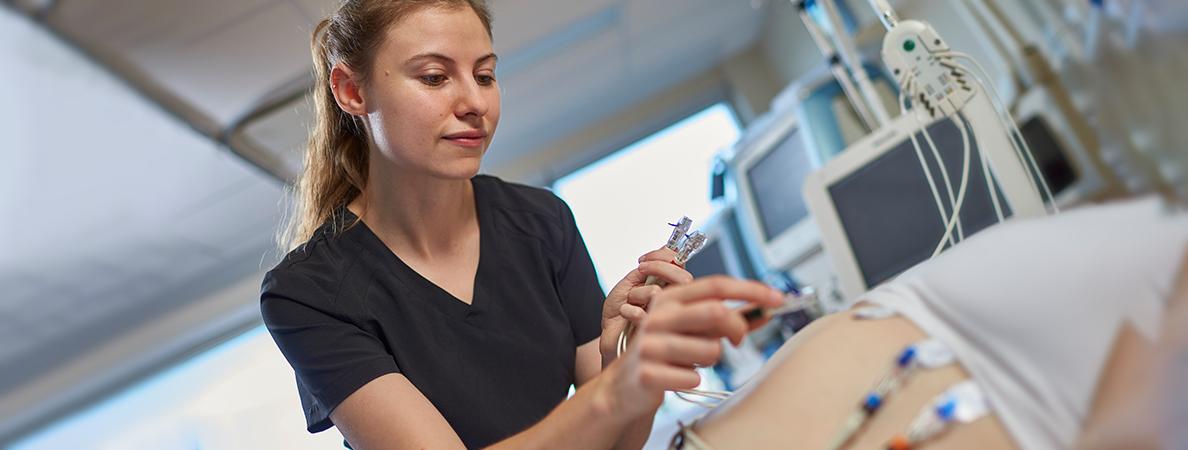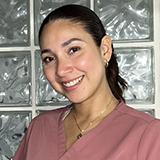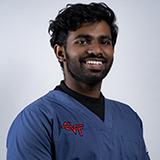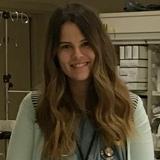Cardiovascular Technology - 728
Overview
Program Highlights
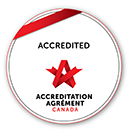
- State-of-the-art-lab facilities.
- Cardiovascular Technology program is an accredited program with Accreditation Canada’s EQual program.
What you'll learn
- The Cardiovascular Technology program outcomes meet the competencies outlined in the Canadian Society of Cardiology Technologists National Competency profile (CSCT NCP). Visit the Canadian Society of Cardiology Technologists to learn more.
- How to perform cardiovascular tests such as electrocardiography, Holter monitoring, exercise stress testing, pacemaker/cardiac device follow-up, ambulatory BP monitoring and ECG event/ loop monitoring.
Program Length
2 academic years
View the Exceptions Calendar for start dates and semester break information.
Admission
Admission
Equal Consideration Fall: February 1
Equal Consideration Winter: June 1
Academic Requirements
- OSSD or equivalent (Mohawk Academic Upgrading, GED) including:
- Grade 12 English, C or U or equivalent
- Grade 12 Mathematics for College Technology (MCT4C) or any Grade 12 U level Mathematics
- Grade 11 or 12 Physics, C or U or equivalent
- Grade 11 or 12 Biology, C or U or equivalent
- Grade 11 or 12 Chemistry, C or U or equivalent
Options are available for mature applicants.
Language Requirements for Applicants with English as a Second Language
- See below for accepted equivalents for Grade 12 English:
- Successful completion of the GAS-English for Academic Purposes (478) program
- TOEFL minimum score of 550 (80 Internet based)
- or IELTS Academic minimum score of 6.0 overall with no band less than 5.5
- More information about acceptable certificates, can be found on the International Admission Requirements
Tuition and Fees
Tuition and Fees
2025 - 2026 Domestic Tuition and Fees
| Description | Semester 1 | Semester 2 | Semester 3 |
|---|---|---|---|
| Compulsory Ancillary Fees | $907.11 | $809.78 | $631.48 |
| Co-op Fees | N/A | N/A | N/A |
| Compulsory Program Fees | $136.00 | $0.00 | $103.00 |
| Domestic Tuition | $1,053.14 | $1,053.14 | $601.80 |
| Total Domestic Charges Per Semester | $2,096.25 | $1,862.92 | $1,336.28 |
| Total 1st Year Fees | $5,295.45 | ||
Above fees based on full-time September program start date. Contact Student Services to confirm fees for other start dates or semesters.
- Full Cost Breakdown
- Explore payment options
- Book costs for your program can be found through the McMaster Campus Store
- If your program includes a clinical, practicum, or field placement, you may be required to complete Preplacement Non-Academic Requirements (NARs). Full details will be provided in your classes. This is an additional cost (above tuition/ancillary fees and textbooks). More information can be found on the Preplacement Services webpage.
2025 - 2026 International Tuition and Fees
| Description | Semester 1 | Semester 2 | Semester 3 |
|---|---|---|---|
| Total Tuition & Ancillary Fee | $8,890.00 | $8,890.00 | $8,890.00 |
| Co-op Fees | N/A | N/A | N/A |
| Program Compulsory Fees | $136.00 | $0.00 | $103.00 |
| International Tax Recovery | $450.00 | $375.00 | $375.00 |
| Total International Per Semester | $9,476.00 | $9,265.00 | $9,368.00 |
| Total 1st Year Fees | $28,109.00 | ||
If you pay by wire transfer, please note your bank might charge you a fee to transfer money. Make sure your transfer includes the Mohawk payment and the wire transfer fee. This applies to each wire transfer payment you make.
- Explore payment options
- Book costs for your program can be found through the McMaster Campus Store
- If your program includes a clinical, practicum, or field placement, you may be required to complete Preplacement Non-Academic Requirements (NARs). Full details will be provided in your classes. This is an additional cost (above tuition/ancillary fees and textbooks). More information can be found on the Preplacement Services webpage.
Additional Information
Financial Assistance
Financial Assistance
When it comes to paying for your education, investing in your future can be more affordable than you think. A Mohawk education is one of the most cost-effective means of acquiring the skills and knowledge you need to have a prosperous and rewarding career.
As you start on your chosen career path, it's important to have a realistic set of expectations regarding the expenses associated with attending college. In addition to your tuition fees, you will also need to budget for books, supplies, housing, and other related living expenses. You may be able to supplement your income and savings with scholarships, bursaries, or loans. It pays to do some research into what types of financial assistance you may qualify for.
Available Financial Assistance Resources:
 OSAP Eligible. Learn about Ontario Student Assistance Program - OSAP (domestic students only)
OSAP Eligible. Learn about Ontario Student Assistance Program - OSAP (domestic students only)- Working on Campus
- Additional Sources of Funding
- Financial Assistance Home Page
Apply for Awards:
By submitting a Scholarships and Bursaries Application every semester, students have access to over $3 million in Mohawk College scholarships, bursaries and Ministry-partnered funding to help meet their financial needs.
Financial Literacy:
Whether saving for school, sticking to a budget, or planning for a major purchase, financial literacy affects us all. That's why Mohawk College is dedicated to helping students improve their financial literacy and become more confident in managing their money.
- Complete the free online Money Matters Module to earn Co-Curricular Credit!
- Financial Resources and Calculators
Program of Studies
Course Overview & Descriptions
Click on the course title for a course description.
Experiential Learning
Experiential Learning
How you'll gain skills
- Through extensive hands-on training during skills courses.
- Clinical training at affiliated hospitals and clinics, during two eight-week unpaid clinical placements, the first in the summer semester of year 1 (semester 3) and the second in the final semester (semester 5).
- Through a mix of on-campus labs and simulations.
To learn more, please visit the Centre for Experiential Learning.
Pre-clinical requirements
All accepted applicants are required to complete certain requirements prior to clinical placement and are responsible for the associated costs. Details about pre-placement requirements will be emailed to you once you accept your offer of admission.
To be eligible for field/clinical placement, you must not have been convicted of any offence for which you have not been pardoned. If your Police Check is 'not clear', your acceptance and suitability for placement is at the discretion of the agency. Mohawk College cannot guarantee placement changes if refused by the agency.
Visit the Preplacement Services webpage to learn more.
Clinical placements
Clinical experience is provided in health care agencies throughout Ontario.
Clinical placements may occur at locations that are not accessible by public transit. Students should expect to either have access to a car or the ability to supply their own transportation when attending clinical placements.
For more information regarding the 600 hour Cardiovascular Technology clinical placement, please contact christine.portwood [at] mohawkcollege.ca (subject: Clinical%20Placement%20Inquiry, body: Hello%20Christine%2C%0A) (the clinical placement specialist.)
Learning Outcomes
Learning Outcomes
Program Learning Outcomes, often referred to as ‘Program Standards', set out the essential learning that a student must achieve before being deemed ready to graduate.
In many cases these program learning outcomes were developed by the Ministry of Colleges and Universities (MCU) in consultation with employers and educators who are experts in the program field. To ensure the outcomes remain current and in line with industry needs, we invite our employers, graduates working in the field and current students to re-examine and update them during regular, ongoing program review focus groups.
Career Opportunities
Career Opportunities
Your future career options
- Cardiology Technologist
- Pacemaker/Cardiac Device Technologist
- Electrophysiology Technologist
- Clinical Application/Procedure Specialist
Where you could work includes:
- Community and Teaching Hospitals
- Ambulatory Health Care Services
- Private Cardiology and Diagnostic Centres
- Cardiac Device/EP Industry
- Cardiac Rehabilitation Centres
- Cardiac Diagnostic Equipment Companies (in Sales or Technical Support)
Educational Pathways
Educational Pathways
Pathways to Mohawk
If you've successfully taken a course at another post-secondary institution, you may be able to earn course exemptions toward your credential here at Mohawk.
If you have successfully completed one of the following programs at Mohawk, you may be eligible to receive transfer credit in this program. To start a new program at Mohawk, you must apply via ontariocolleges.ca.
Transfer from
You can transfer to the Cardiovascular Technology - 728 from the following programs:
Canadian Health Care for Foreign Trained Professionals (International Only)
Pre-Health Sciences Pathway to Advanced Diplomas and Degrees
Pre-Health Sciences Pathway to Certificates and Diplomas
Receiving Program
Cardiovascular Technology
Transfer to
You can transfer from the Cardiovascular Technology - 728 to the following programs:
Diagnostic Cardiac Sonography
Credit transfer agreements have been arranged to make it easier for students to move from Mohawk to another institution.
Transfer From Cardiovascular Technology To
Athabasca University
1 University Dr
Athabasca AB T9S 3A3
Canada
Bachelor of Science - PD
Bachelor of Science - PD with Majors:
- Applied Mathematics
- Computing Information Systems
- Human Science
1 University Dr
Athabasca AB T9S 3A3
Canada
Thompson Rivers University
805 TRU Way
Kamloops BC V2C 0C8
Canada
Bachelor of Health Sciences
805 TRU Way
Kamloops BC V2C 0C8
Canada
Mohawk College makes every effort to ensure the accuracy of each transfer opportunity. Please note that changes may occur in program offerings, admission requirements, and transfer credits granted by the receiving institutions. We advise all students to check with the receiving institution directly for the most up-to-date information.
Don’t see what you’re looking for? Search ONTransfer.ca for more pathways with Ontario public colleges and universities.
Mohawk College makes no warranty or endorsement of material contained within links to external websites, nor does the College assume any responsibility for the linked website or its contents.
Additional Information
Additional Information
The Cardiovascular Technology program outcomes of the Cardiovascular Technology program meet the competencies outlined in the Canadian Society of Cardiology Technologists National Competency profile (CSCT NCP). Visit the Canadian Society of Cardiology Technologists to learn more.
Functional Demands
The Cardiovascular Technology health professions are intellectually, emotionally and physically demanding. It is important that applicants become familiar with the profession before entering the program so that they are able to function at an acceptable standard. Learn about the functional requirements and physical demands for Cardiology Technologists (NOC 3217).
Physical Demands include:
- Standing for an extended time
- Move/transfer patients with limited mobility
- Provide emergency life support
- Communicate with patients and visually assess their health
Skills courses
All students will be required to act as simulated patients for their peers in skills course labs and during skills practice sessions.
Faculty
Program Coordinator
Faculty
Contact Us
Contact us
Domestic Canadian Students
Contact Student Recruitment
Haven’t applied yet and have questions?
Contact our Student Recruitment team for information on programs, how to apply, and more.
Contact Admissions
Contact our Admissions advisors for help with your application.
Email Admissions
Book an Appointment ⤻
Phone: 519-767-6871
International Students
Contact International Student Recruitment
Contact our International Student Recruitment team for information on programs, how to apply, and student life.
Contact International
Email: intl.representatives@mohawkcollege.ca
Phone: 1-905-575-2254
Toll free phone numbers:
For general questions: 1-888-Mohawk9 (1-888-664-2959)
Contact International Admissions
Contact our Admissions advisors for help with your application.
Contact International Admissions
Phone: 1-905-575-2254
*Not all programs are international eligible. Please see our programs available for international students.
Accessible Learning Services
Are you a student with a confirmed or suspected disability? Visit our Accessible Learning Services website to discover how we can help you.
Program Coordinator
Discover the Institute for Applied Health Sciences at McMaster
The Institute for Applied Health Sciences (IAHS) is located in West Hamilton on the McMaster campus. The IAHS campus is where the majority (but not all) of our health programs are taught. Learn more about the IAHS:
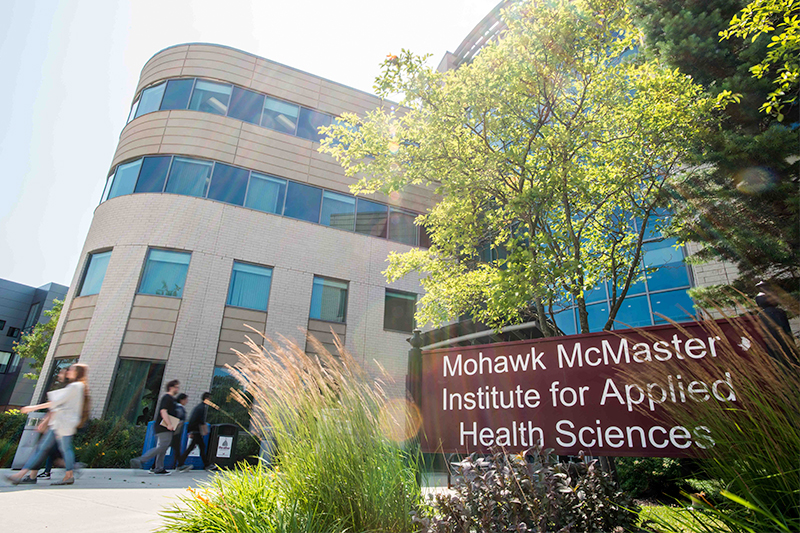
We're here to help
We’re here to support you throughout the admissions process with online and virtual services. For general inquiries, please call 519-767-6871.
Applied and have questions?
Email Admissions or Book an appointment in person or by phone.
Haven’t applied and need help?
Email Recruitment or Book an appointment in person or by phone.
Applied as an international student?
Email International Admissions.
Program delivery
Learn about program delivery terms.
Please note: in-person, virtual, and hybrid classes vary according to the program and some programs may be in-person only. Refer to the Program Overview for more information.


